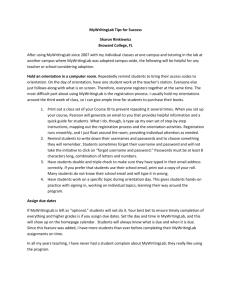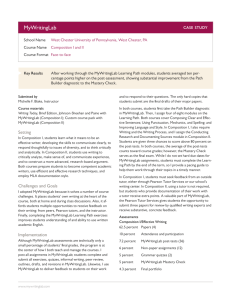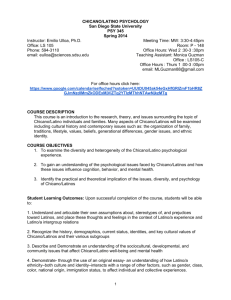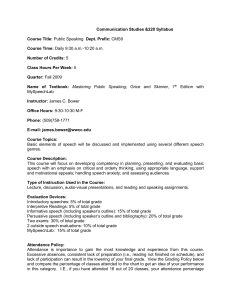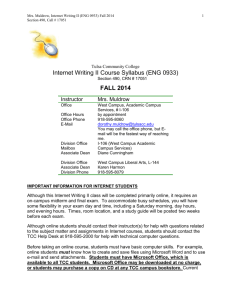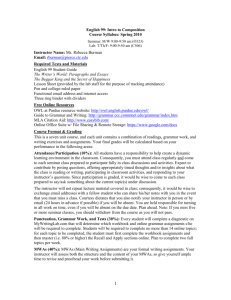MyWritingLab case study
advertisement
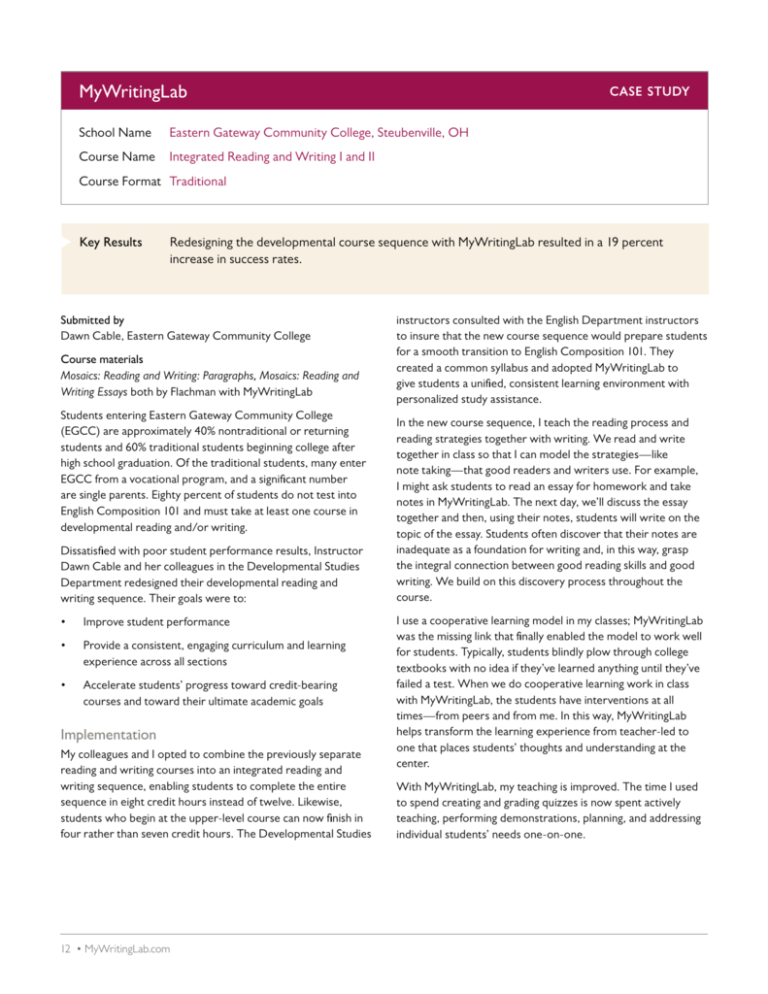
MyWritingLab School Name case study Eastern Gateway Community College, Steubenville, OH Course Name Integrated Reading and Writing I and II t Course Format Traditional Key Results Redesigning the developmental course sequence with MyWritingLab resulted in a 19 percent increase in success rates. Submitted by Dawn Cable, Eastern Gateway Community College Course materials Mosaics: Reading and Writing: Paragraphs, Mosaics: Reading and Writing Essays both by Flachman with MyWritingLab Students entering Eastern Gateway Community College (EGCC) are approximately 40% nontraditional or returning students and 60% traditional students beginning college after high school graduation. Of the traditional students, many enter EGCC from a vocational program, and a significant number are single parents. Eighty percent of students do not test into English Composition 101 and must take at least one course in developmental reading and/or writing. Dissatisfied with poor student performance results, Instructor Dawn Cable and her colleagues in the Developmental Studies Department redesigned their developmental reading and writing sequence. Their goals were to: • Improve student performance • Provide a consistent, engaging curriculum and learning experience across all sections • Accelerate students’ progress toward credit-bearing courses and toward their ultimate academic goals Implementation My colleagues and I opted to combine the previously separate reading and writing courses into an integrated reading and writing sequence, enabling students to complete the entire sequence in eight credit hours instead of twelve. Likewise, students who begin at the upper-level course can now finish in four rather than seven credit hours. The Developmental Studies 12 • MyWritingLab.com instructors consulted with the English Department instructors to insure that the new course sequence would prepare students for a smooth transition to English Composition 101. They created a common syllabus and adopted MyWritingLab to give students a unified, consistent learning environment with personalized study assistance. In the new course sequence, I teach the reading process and reading strategies together with writing. We read and write together in class so that I can model the strategies—like note taking—that good readers and writers use. For example, I might ask students to read an essay for homework and take notes in MyWritingLab. The next day, we’ll discuss the essay together and then, using their notes, students will write on the topic of the essay. Students often discover that their notes are inadequate as a foundation for writing and, in this way, grasp the integral connection between good reading skills and good writing. We build on this discovery process throughout the course. I use a cooperative learning model in my classes; MyWritingLab was the missing link that finally enabled the model to work well for students. Typically, students blindly plow through college textbooks with no idea if they’ve learned anything until they’ve failed a test. When we do cooperative learning work in class with MyWritingLab, the students have interventions at all times—from peers and from me. In this way, MyWritingLab helps transform the learning experience from teacher-led to one that places students’ thoughts and understanding at the center. With MyWritingLab, my teaching is improved. The time I used to spend creating and grading quizzes is now spent actively teaching, performing demonstrations, planning, and addressing individual students’ needs one-on-one. MyWritingLab: Eastern Gateway Community College “My favorite aspect of MyWritingLab is that everything is packaged in one place— the eText, assignments, and Gradebook.” 100% Percentage of Students The Student Experience Success Rates 83% 80% 79% 64% 60% 40% 20% 0% 2010/11 without MyWritingLab 2011/12 with MyWritingLab 2012/13 with MyWritingLab Figure 1. Student Success Rates, Fall 2010–Spring 2012 (For both 2010/11 and 2011/12, n=67; for 2012/13, n=52. Success rate=the percentage of students receiving a grade of A, B, or C in the course.) Benefits • Increased student success rates • Students are better prepared for their for-credit English courses • More consistent, student-focused instruction across sections Results and Data Student performance improved dramatically in the redesigned course sequence where we saw a 19% increase in success rates (figure 1) after implementing MyWritingLab in 2011/12 and a 15% increase in 2012/13. Because of the eText, videos, and assessments in MyWritingLab, my students now spend more time truly learning and connecting information prior to completing assignments. My favorite aspect of MyWritingLab is that everything is packaged in one place—the eText, assignments, and Gradebook. MyWritingLab’s individualized study plan enables students to pace themselves and to work only on the specific things they need to master. MyWritingLab gives students multiple chances to master the material and provides immediate feedback, all without making more work for the instructor. There is no risk of failing, because MyWritingLab provides ample chances for a motivated student to succeed. Students can even complete the course ahead of schedule. Conclusion As a result of our course redesign with MyWritingLab we are sending students on to credit courses so much better prepared than before. The Developmental Studies instructors recently met with our colleagues in the English Department to assess results of the redesigned course sequence with MyWritingLab and the English instructors unanimously said “Don’t change a thing; we love it.” An English Composition 101 instructor commented to me that now, when he tells a student to edit for fragments, the student knows exactly how to proceed. These results are very satisfying to us and completely validate our choice of MyWritingLab. MyWritingLab.com • 13 PearsonCourseConnect.com

